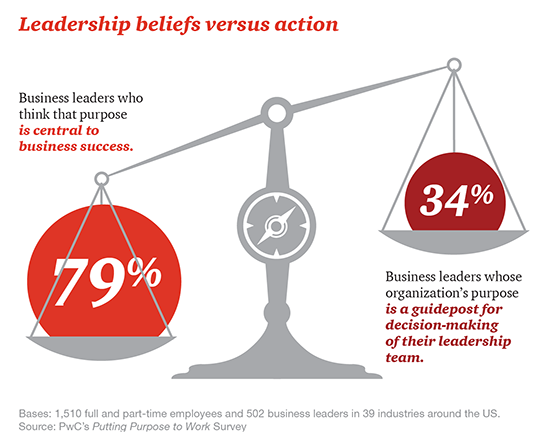I’m seeing a trend in the human capital management space wherein vendors/consulting firms are creating mini-whitepapers rather than big research reports. The continuation of “Snack Nation,” I guess. But I like it. For those among us who just don’t have the time to sit down and focus on a lengthy research report, these snackable bits of relevant research and content are helpful. And PwC does a better job than most of serving up helpful content based on current research and analysis.
Take Putting Purpose to Work: A study of purpose in the workplace (published a year ago). It’s a 14-page, easy to read document that walks the reader through a discussion of the meaning of your organization’s purpose for your employees and what it can mean for your business. As we learn more and more about what drives the younger generations in our economy, there’s no denying that purpose is discussed a great deal in the C-Suite as the war for talent wages around us.
Data in the report are based on a survey conducted by PwC that included 1,510 full- and part-time employees and 502 U.S. business leaders from 39 industries – from both public and private companies, as well as partnerships, government/state-owned agencies, and non-profits.
“The current era of disengaged, transient talent impacts every aspect of the business, and the need to activate purpose at work has never been more urgent.”
This is the thesis of the report. And it’s hard to argue against it.
The reports argues that the following commitments are critical as leaders create a purpose driven culture:
- Make purpose accessible
- Emphasize the human element of purpose
- Include purpose at the center of your talent strategy
For leaders – including those in HR – the following graphic provides interesting food for thought.

This is a striking disconnect, and one that HR leaders could take the lead in eliminating. It shows that, while there is understanding in the C-suite regarding the criticality of purpose in business success, there is a lack of will in operationalizing purpose in the business.
What’s the story in your organization? Does the C-suite believe that your organization’s purpose is central to its success? And if it does, how is it manifested in your employees’ day-to-day lives on the job? Good questions for all leaders whether or not they’re in HR.
Of the five key insights itemized at the beginning of the report, the second really resonates and is a bit of a warning:
“Business leaders tend to focus on the value in defining and illuminating purpose for commercial success. For employees, purpose represents an avenue by which they find personal fulfillment. This disconnect is preventing companies from reaping the comprehensive potential benefit of defining what they stand for as an organization.”
Some food for thought.
This article originally appeared on ChinaGorman.com.
